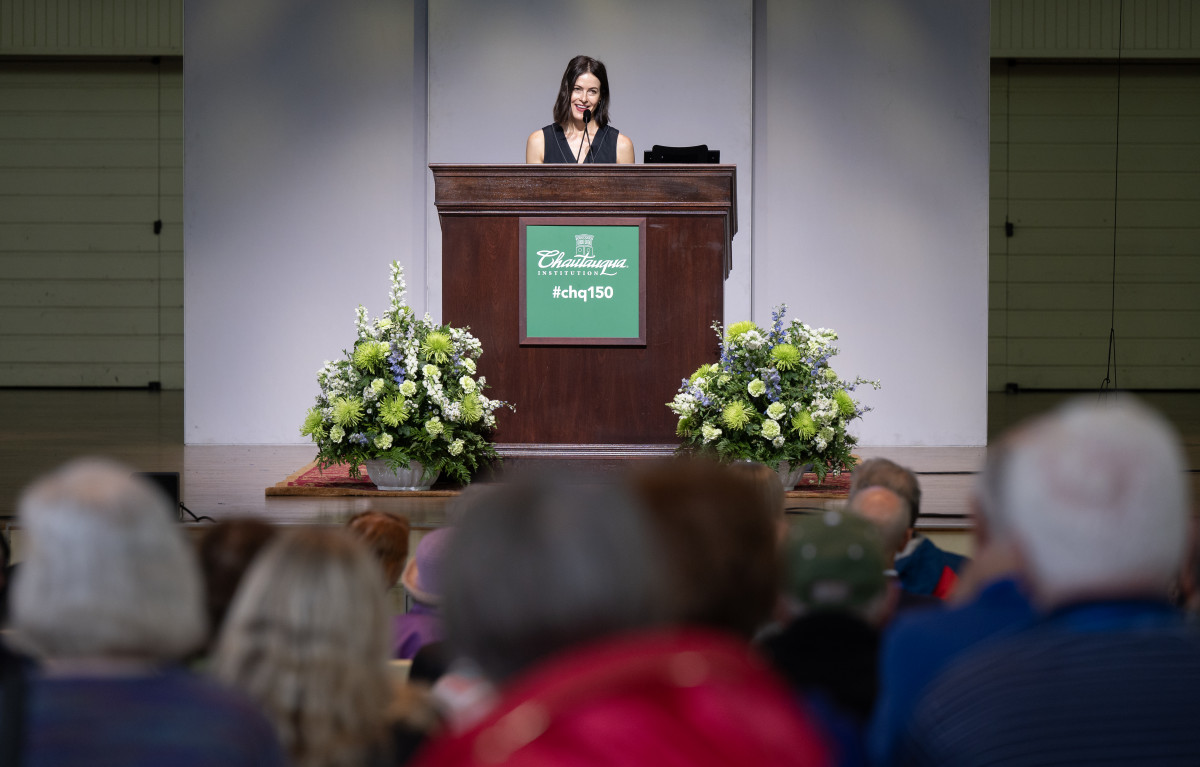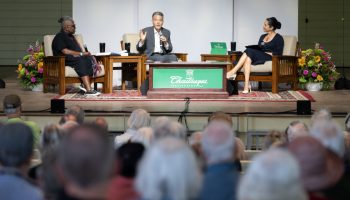
Bethany McLean, co-author of The Big Fail: What the Pandemic Revealed About Who America Helps and Who it Leaves Behind, delivers her morning lecture Thursday in the Amphitheater, part of the Week Three Chautauqua Lecture Series theme “What We Got Wrong: Learning from Our Mistakes.”
Bethany McLean took the stage Thursday morning in the Amphitheater for the Chautauqua Lecture Series Week Three theme, “What We Got Wrong: Learning from Our Mistakes,” to discuss what the world got wrong in its response to the COVID-19 pandemic.
McLean, currently a contributing editor at Vanity Fair, is the co-author of The Big Fail: What the Pandemic Revealed About Who America Helps and Who it Leaves Behind. She’s also the co-author of The Smartest Guys in the Room: The Amazing Rise and Scandalous Fall of Enron, which she spoke about at Chautauqua in 2011.
For much of her career, McLean has written primarily about various economic scandals and catastrophes.
When she first wrote the article exposing the corruption at the energy company Enron, McLean said she was surprised at how often experts and people in positions of authority hesitated to admit when they didn’t understand something, or needed additional clarification on an issue.
One of the most important things she’s learned in her career, she said, is that there are limitations to people’s understanding — it doesn’t matter of what — and no one wants to admit when they don’t know something they think they should. That hesitancy to admit limited or no expertise is human, but it’s also a fatal flaw in a person’s thinking.
McLean contextualized these limits of expertise within various financial crises and scandals, like those at Enron, Theranos, FTX and others.
She cited the Wells Fargo cross-selling scandal, in which employees opened millions of fake savings and checking accounts in order to meet sales goals, to explore what she sees as an overreliance on financial models because of their perceived neutrality, predictability and truth.
“The old adage about models is true: Garbage in, garbage out,” she said.
Models were also employed in the onset of the COVID-19 pandemic, and McLean talked about the resulting, unprecedented lockdown that followed, even when little was known about the severity or transmission of the virus.
“The West, desperate and afraid, basically just copied China’s draconian policy, one that, initially, the World Health Organization called unprecedented in public health history,” McLean said. “… A professor of global health at Georgetown University said, initially, ‘these kinds of lockdowns are very rare and never effective.’ ”
Many people in places of privilege were able to stay home, isolating and protecting themselves, only because they relied on essential workers who didn’t have the same privileges.
“The basic questions went not only unanswered, but unasked,” McLean said. “What would happen when restrictions were lifted? Could you make a highly contagious respiratory disease go away once it was seeded through the population? Who needed to be protected the most? Was the collateral damage from lockdowns, particularly to underprivileged children who couldn’t go to school, worth the cost?”
She thinks a lot about the public’s desire and willingness to follow the rules without questioning the rules in the first place.
“It comes back to this idea of self-delusion,” she said. “Sometimes we employ self-delusion as a means of protecting ourselves.”
She also thinks that people rely too often on the authority and knowledge of others, using it as a justification for one’s own complicity in a situation.
McLean has witnessed the failures and pitfalls of capitalism; she’s still a firm believer in it, but thinks it is imperative to “make capitalism work for everyone.” The government, for example, has an essential role in creating systems and structures that allow businesses to function.
“If the rules set by the government determine the ability to make money, then isn’t it important to make sure those rules are the right ones? And, if favors granted by the government enable the existence of a particular industry, doesn’t that industry owe something to society in return? Maybe there are spheres in which capitalism shouldn’t be the operating principle, where other values should be at play,” she said. “Or, maybe it would work, but we haven’t set the rules effectively.”
This was what the pandemic demonstrated — collapsing medical supply chains, pressure placed on poorer hospitals, and rising death tolls in nursing homes. All of these things, she argued, were somewhat predictable as they were the result of larger trends in American capitalism.
Decades of rising globalization was a primary cause of these pandemic-related decisions, even though those decisions came years down the line. Supply chains stretched to maximize profits led to extreme shortages, and this resulted in the maximization of profit at the expense of healthcare patients.
“What happened in the pandemic, of course, also negated the very notion of a healthcare system, which presupposes a goal of making people healthier,” McLean said, “not creating a world, a Darwinian world, in which your value — maybe or even your life — is determined by your ability to pay.
“We’ve allowed that idea that ‘if it makes money, it’s good,’ to shape the whole system. Take the decision by many states to reduce the number of hospital beds,” she said. “They did so believing that this would tame spiraling healthcare costs. Theoretically that makes sense, but the game was rigged.”
Hospital closures are primarily determined by their profitability, and hospitals that serve poorer communities are less profitable than those that serve wealthier ones. As a result, she said, eliminating hospital beds disproportionately impacts poor communities.
McLean also pointed to another dangerous trend: the increasing size and role of private equity in society.
“Private equity’s only duty is to their investors. They are bound to make money,” she said. “So, if the government allows them into an industry, then you cannot expect there to be any other values at play. … There’s a problem there, when the people who make the most and benefit when times are good also get to say, when times are bad, ‘You have to save us or everyone else will suffer the most.’ ”
So often, when something goes wrong, “we end up rewarding the big and punishing the small.” She cited the 2008 financial crisis — in which the government bailed out big institutions while offering little assistance to homeowners — and compared it to bailouts for big companies and the rich during the early phases of the pandemic, while those without large assets didn’t get nearly as much.
McLean said the PPP distributed during the pandemic, though it greatly contributed to the national debt, was a critical and integral support. She pointed out that while there was a system in place for distributing aid to big institutions, it became clear during the pandemic that there was not a similar system in place for distributing equitable aid to individuals.
McLean continued to lay out the parallels between financial crises throughout recent history and the pandemic, explaining the danger of “short term-ism” in strategic decision-making.
“I thought, after the pandemic, we would examine what we had done — what worked, what didn’t work — as part of a road map for what we should do in the future,” she said.
Instead, the “best we’ve been able to do” is a hearing in front of the House Committee on Oversight and Accountability, with testimony from Anthony Fauci.
“It was ugly and mostly pointless, the testimony bogged down in a partisan debate about the origins of the virus,” McLean said. “America’s yawning divides were on display, with Democrats falling all over themselves to defend Fauci, and Republicans attacking him as a devil incarnate.”
There are very legitimate questions to be asked about the government’s response to the pandemic, she said, and the refusal to learn as the pandemic evolved.
“ ‘Follow the science’ became a mantra for all good people — somewhat ironic given that there was never much science,” she said, “and also somewhat ironic given that science, at its best, is a system of asking questions, a way of formulating a thesis and a belief that, then, you listen to the evidence and you change that thesis.”
There was some optimism to be found in Operation Warp Speed, which she described as being a “fantastic example of how government and business can work together,” creating a vaccine with unprecedented swiftness. Vaccines are not seen as very profitable, McLean said, given the ebbing and flowing nature of past pandemics. As such, with little profit incentive, there’s not usually a rush to manufacturing. COVID-19 was different, and the public and private sector worked in conjunction with the U.S. Army in order to facilitate the logistics of the creation, manufacturing, and dispersal of the vaccine.
This vaccine rollout, she said, was nonpartisan and in pursuit of a greater good.
“I think if more of us could set aside our politics in moments of need, we would all be the better for it,” she said.
McLean believes that markets need a sense of morality, but she’s not sure if that’s feasible, since morality is born out of shame, and because the market is so profit-driven.
The relationship between businesses and the government is reciprocal; the two need each other, she said. She cautioned against oversimplifying complicated situations — such as the pandemic response. Another important lesson she wanted to impart is that “nothing trickles down.”
“There are things we all absolutely believe — that are core to us — but can we, on other things, learn to listen to other people? Learn to hear what other people have to say, (even those) who might disagree with us? I think if we operate from the principle of keeping our ideology small, yes, we can,” she said. “I think, most of all, we all need to learn to say ‘I don’t know.’ ”
McLean ended her lecture by stressing that our infrastructure, institutions, and systems of order are balanced precariously upon the ability to trust one another and our institutions, to act with humility, to tolerate uncomfortable questions, to look at institutions and systems critically and to envision how to change things to create a better world.




